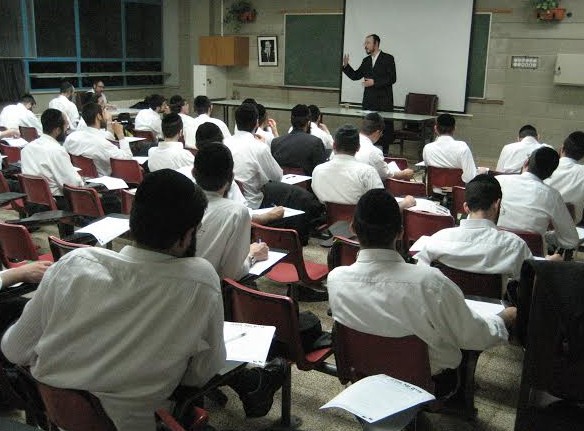Borrowing Half a Bottle of Oil and Returning a Full Bottle? Beware of Ribit!
It's one of the least discussed commandments today, yet one of the most important. Despite this, it turns out we often fail to observe it. An interview with Rabbi Pinchas Wind, an expert on the laws of ribit.

We are all familiar with the concept of "ribit", whether from the loans we take from time to time at the bank, or the mortgage we're trying to secure to buy the home of our dreams. We all pay it thoroughly at some point in our lives. Nevertheless, the term ribit, according to the Torah, is a much broader concept, relating to many life situations, and more importantly: it is considered one of the most severe transgressions in the Torah. Therefore, as the year draws to a close, and as each of us reflects on our actions, it is crucial to be aware of this severe offense.
Did you know, for example, that a worker suing their employer for delayed wages, taking a loan from a bank, borrowing groceries from a neighbor, or lending to a non-Jew could lead you to violate the prohibition of ribit?
To understand the prohibition of ribit, we spoke with Rabbi Pinchas Wind. Wind, 44, is a multifaceted figure who, in addition to managing "The Ribit Line", which deals with questions regarding the laws of ribit, has authored a book on the subject titled "Ribit Halacha Lemaseh – Brit Pinchas". He also serves as a senior lecturer and school principal.
 Rabbi Wind with Gaon Rabbi Steinman
Rabbi Wind with Gaon Rabbi SteinmanUnfortunately, according to Rabbi Wind, few in our generation know how severe the prohibition of ribit is, and it is actually what drives away blessings from the household of one who fails in it. "The Midrash says that for any other transgression, when the Day of Judgment arrives, angels advocating for the person come to plead on his behalf. However, a person who has fallen into the prohibition of ribit has no advocating angels speaking for them. Instead, only their liabilities are listed, which determines their judgment." Not a very cheerful view, is it? So what can we do to prevent this?
Borrowed Half a Bottle of Oil, Returned a Full Bottle? Prohibition of Ribit
A hundred years ago, when someone wanted to buy a cupboard, they had to wait a few months to save up the full cost and pay it entirely. Hence, they rarely if ever violated the prohibition of ribit. Today, because we all deal with banks, credit cards, and such, and often have to buy a cupboard or anything else "on credit", in other words - in installments, the mitzvah of ribit becomes more relevant than ever. "Today, anything a person buys in installments or a loan from the bank - they pay interest on it. When the store or business charges a different price from the original cost, the Mishna, the Gemara, the Beit Yosef, and all other authorities say that it is strictly forbidden. Bringing it down to everyday life, even someone who did not receive their salary on time and decided to sue the employer for delayed wages can violate the prohibition of ribit."
At this point, Rabbi Wind presents simpler examples which surely everyone has encountered at some point – and they are considered a violation of the severe prohibition. "If, for example, a woman is stuck without eggs for a cake she's already started making. She approaches her neighbor and asks for two eggs and half a bottle of oil. Naturally, she promises to return a full bottle because, after all, it's not polite to return half; she is being 'large'. Here we have a situation where the neighbor, while fulfilling a mitzvah of kindness from the Torah, does not realize she's causing her neighbor to violate ribit, and the mitzvah she did is a mitzvah that came with an offense. If you took half a bottle of oil, you should return only half a bottle."
At this juncture, Rabbi Wind insists on delving deep to explain the severity from a halachic perspective. "Many people ask me, 'So what if I received a bit more from the person I lent to? I gave half a bottle of oil and got back a bottle, big deal. What happened?' But it is crucial to understand the depth of these matters – the punishments incurred by someone who fails in ribit are not mentioned anywhere else in the Torah. The Midrash says that someone who lends with ribit, God forbid, is not destined to rise at the resurrection of the dead, something not said about anything else. Additionally, it is no coincidence that the numerical value of the word 'ribit' is 612, to tell you that this commandment completes all other commandments for you. The Maharal writes that 'anyone who observes ribit, is rewarded as if he kept the entire Torah, not just the ribit', and vice versa. Whoever transgresses the prohibitions of ribit, it is as if he transgressed the entire Torah, heaven forbid."
"Even Children Fail in the Prohibition of Ribit"
According to Rabbi Wind, like other education commandments that begin in infancy, the education for caution against the prohibitions of ribit should start at a very young age. However, he points out that "it is never too late to start". He further adds that the commandment is relevant to children not only to educate them according to Jewish law but because they themselves may easily violate it. "As an educator, I see these cases all the time. Recently, a child in my class told me he owed his friend four shekels, and his friend pressured him to return the debt. To 'shake off' the friend's urges, the debtor promised his friend, 'I don't have four shekels now, but don't worry, if you wait until Purim, I'll give you six shekels from my Purim money, not four'. So the children agreed among themselves, and this is ribit from the Torah for all opinions and methods." So how do you avoid this? Very simply. Rabbi Wind claims that "there are countless experiential methods through which parents can teach their children – what is forbidden and what is allowed. There’s no doubt, by the way, that learning with the child in itself greatly enhances the parent".
 Rabbi Wind giving a lesson
Rabbi Wind giving a lessonCan the study of the laws of the ribit commandment be understood and practiced by everyone?
Rabbi Wind's smile widens. "Absolutely yes. Studying the laws of ribit is like studying the laws of Shabbat, or any other laws. It's not something easy to do at once, but exactly for this reason, 'The Ribit Line' was established, which we have been operating with Hashem's help for about three years, and through it we assist people in fully understanding the subject."
From what you see so far, who actually uses "The Ribit Line"?
"The audience addressing 'The Ribit Line' is diverse. It includes people from across the spectrum, from religious Jews, those who are newly observant, traditional, and even many secular people, both from Israel and abroad. We truly see firsthand just how much Israel is a 'holy nation'. In our lectures throughout the country, for instance, on the subject of ribit, we are faced with many severe cases, where a person opposes the whole world, in discussions lasting from here to America, over another 1000 shekels. But once that person hears there is a chance they have violated the prohibition of ribit, usually, they immediately back off. They’re smart enough to understand that the world operates under 'measure for measure', and 'according to what a person measures, so they measure for him', and they are afraid."
In conclusion, Rabbi Wind wishes to strengthen the hands of the public, to raise awareness, and to study the laws of the subject in depth. " Awareness of the issue of ribit may have increased in recent years, but it still requires reinforcement. Therefore, it is essential to note that even if the laws seem frightening and too complex to learn, however, once people know how and what to do, everything becomes easier. Most of us don’t know the laws of ribit because we weren’t educated to observe them from childhood, so it kind of fell through the cracks. Yet, at the same time, we are obliged to close this gap."
Do you have additional questions regarding ribit? Contact the 'Ribit Line' at number 057-3110820 daily between 14:00 and 15:00, and you can receive professional and swift assistance.

